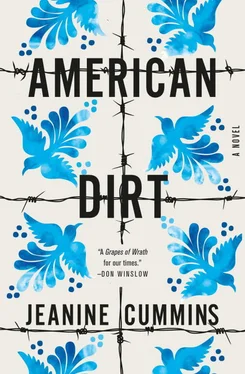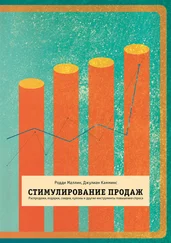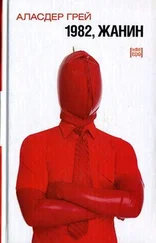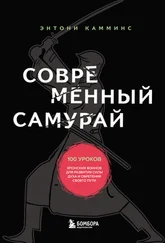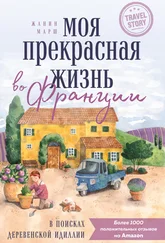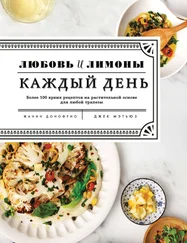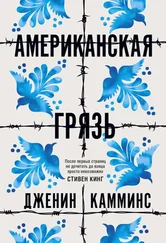Lydia takes a sharp breath, but Neli waves a hand dismissively. ‘That’s just trying to buy people’s loyalty,’ she says. ‘Propaganda.’
‘But maybe the reason is less important than the fact,’ Julia says. Then she drops her voice to a whisper and leans in again, closing the space across the table to a tight circle. She names the unnameable cartel. ‘Los Zetas feed people their own body parts. Los Zetas hang babies from bridges.’
Lydia covers her mouth with her hand. Her fingers are cold and stiff, and beside her, Ixchel is crossing herself. Lydia will ask a question now, but she’ll make her voice light. Neutral.
‘So last night, the guy who got kicked out – which cartel was he?’
Julia shrugs. ‘I don’t know,’ she says. ‘But if he really wants out, he better run. Far and fast, right? They don’t let those guys go.’
Lydia pushes her plate away. Far and fast, she thinks. Some things are so simple.
Six days and 282 miles from absolute calamity, Lydia and Luca take their leave from Huehuetoca and head north once again, following the trail of La Bestia . When Lydia considers how they’ve managed to survive the last week, to get this far from Acapulco and remain alive, her mind seizes. Because she knows she’s made both good and bad decisions in those six days, and that ultimately, it’s only by the grace of God that none of those choices have met with bad luck and resulted in catastrophe. That awareness incapacitates her. She can’t conceive of a plan to board the train, which is what they must do. They must get on the train. Meanwhile, walking will give her time to think. They filled their canteens before they left the shelter, but they stop at a small shop down the road and Lydia jams her bag with snacks. Because it’s a shop that’s used to migrants, they stock the kinds of things that migrants can carry and eat: nuts, apples, candy, granola, chips, carne seca . Lydia buys as much as she can fit in her pack. She buys a floppy hat, too, pink with white flowers, to protect her neck from the sun. It reminds her of the ugly thing Mamá used to put on when she gardened, and any time Lydia and Yemi caught their mother wearing it, they would titter and tease.
‘You laugh, but this hat is the reason I have the skin of a twenty-four-year-old!’ their mother would chide them.
Back outside, the freight tracks stretch out across the Mexican landscape like a beanstalk migrants must climb, and Luca and Mami go step by step, tie by tie, leaf by leaf. The sun is bright, but not too hot this early in the day. They hold hands briefly, and then sweat and separate, and then the cycle repeats. They take the westernmost route because Luca’s mind-map was convinced that, though that way was longer than the others, the relative topography would be kinder if they end up making much of the journey by foot, as it appears they might. He’s glad Mami didn’t press him to explain his instinct; she simply yielded to the gentle pressure of his hand as they’d set off.
Lydia knows that her plan to go to Denver is inadequate, that it might be difficult to track down her tío Gustavo. Abuela used to complain that her baby brother had turned into a gringo when he left for el norte all those years ago, when he was still a young man, and never looked back. Lydia knows only that her tío married a white lady, changed his name to Gus, and started his own company, something in construction. Was it plumbing or electric? And what if he changed his last name, too? She’s never met his children, her primos yanquis. She doesn’t even know their names. When she dwells too long on these facts, she begins to panic, so she strips it all back to manageable, step-by-step pieces: Move north. Reach the border. Find a coyote. Get across. Take a bus to Denver . There will be churches there. Libraries, internet access, immigrant communities. People willing to help. For now just move north, move north. Get Luca out of danger.
A couple hours’ walk northwest of the migrant shelter, Luca and Mami encounter two teenage sisters wearing matching rainbow wristbands on their slender left arms, sitting on an overpass above the train tracks, and dangling their feet below. Both girls are very beautiful, but the slightly older one is dangerously so. She wears baggy clothing and an intense scowl in a failing effort to suppress that calamitous beauty. The younger one leans back on her stuffed backpack, but they both sit up when they see Luca. The studied hardness of their expressions melts. Together they make the ‘oh’ of cuteness that teenage girls often emit for smaller children.
‘ ¡Mira, qué guapo! ’ the younger sister sings out in an unfamiliar accent.
‘So cute,’ the older one agrees.
They both have abundant black hair; stark, expressive eyebrows; dark, penetrating eyes; perfectly aligned teeth; full lips; and apple-shaped cheeks. The older one has something extra, something undefinable that makes her entirely arresting. Luca fixes his eyes on her accidentally and cannot seem to remove his gaze once it’s alighted upon her. Mami does, too. The girl is so beautiful she seems almost to glow, more colorful than the landscape in which she sits. The dingy gray of the concrete overpass, the pebble brown of the tracks and the earth, the faded blue of her baggy jeans, the dirty white of her oversize T-shirt, the bleached arc of the sky, it all recedes behind her. Her presence is a vivid throb of color that deflates everything else around her. An accident of biology. A living miracle of splendor. It’s a real problem.
‘ Oye, ¿adónde van, amigos? ’ the less beautiful one calls out to them when they’re directly beneath her feet.
‘Where everyone goes,’ Lydia says, shielding her eyes so she can look up at the girls above them. ‘To el norte .’ She removes the ugly pink hat from her head and uses it to fan herself. Beneath it, her sweaty hair sticks to her forehead.
‘Us, too!’ she says, swinging her feet. ‘Your son is so cute!’
Lydia looks over at Luca, who’s smiling up at the girls, the most genuine smile that’s escaped his face since the morning of Yénifer’s quinceañera .
‘My name is Rebeca, and this is my sister, Soledad.’ The girl speaks to Luca directly. ‘¿Cómo te llamas, chiquito?’
Lydia, who’s fallen into the habit of answering for her silent son, opens her mouth to reply but –
‘Luca,’ he says. His voice clear like a bell, no hint of rust from all those days without use. Lydia snaps her mouth shut in surprise.
‘How old are you, Luca?’ Rebeca asks.
‘I am eight years old.’
The sisters look at each other with animation, and the younger one claps her hands together. ‘I knew it! Just exactly the same age as our little cousin at home. His name is Juanito. He looks like you! Doesn’t he look like Juanito, Sole?’
Soledad the Beauty smiles reluctantly. ‘He does,’ she admits. ‘Like twins.’
‘You want to see his picture?’ Rebeca asks. Luca looks at Mami, who’s been very cautious about stopping to talk with people. But these girls have returned her boy’s voice to him. She nods. ‘Come up!’ Rebeca says.
She removes a fragile plastic bag of wrapped photographs from the front pocket of her sister’s backpack and flips through them. Luca scrambles up to join the girls on the overpass while Mami watches from below. She tries to survey their location, but the seam of land cut by the tracks here makes a poor vantage point for visibility, so she follows Luca up the steep, sandy little hill. The girls aren’t actually sitting on the overpass at all, but on a metal grate that sticks off the roadway on one side of the overpass like a hazardous catwalk. Lydia tests it with her foot before stepping over. Luca squats on the roadway side, leaning his elbows on the low guardrail. Rebeca leans back against this, and together they stare at the pictures.
Читать дальше
